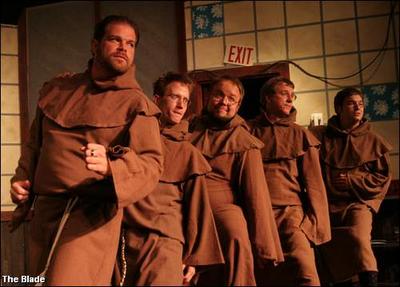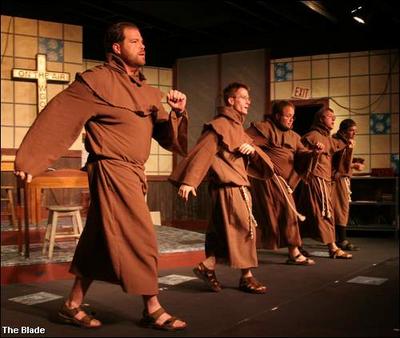Who cares?
Funky monks
Village Players’ religious farce delivers us from evil by Tobias Dean
OK, so the premise of "Monky Business" isn’t exactly Chekhov: A monastery, deeply in debt, about to be taken over by a big bad land developer who will turn it into a gaming casino. But the implausible proposition is as good as any to string together some witty dialogue, and showcase quirky musical numbers with such daffy rhymes as "God has … seraphim to take care of Him."
" Monky Business" features an ensemble cast, with all five characters fairly well-matched, not only in the number of lines (except for the mute one…), but also in the strength of acting and vocal prowess. Credit goes to the cast, as they are all onstage for almost the entire production. For those who think this no mean feat, remember the pressure of delivering those 10-minute presentations in Public Speaking 101? Now, to dialogue and lyrics, add blocking and choreography, and one begins to see the magnitude of the accomplishment.
Paul Soska, as the Brother Lee Love, stands out in both his vocal proficiency and character portrayal, being both piously pitiful and boundlessly enthusiastic. David Dysard, as Brother Brooks, gives us a delightful depiction of the kind of managerial style, found in every hierarchy and organization. He is the idiosyncratic, anxiety-ridden leader we all love to hate. Matt Richardson in the role of Brother Clarence (apologies made to all "It’s a Wonderful Life" devotees) is a deliciously distasteful, deviously duplicitous demon, who could have been just a dash more oily for my taste, but received audience raves for dramatic eyebrow work.
Jeffery Thomas King depicts Brother Forte, a mute. Yet, his enthralling exploits in the first Act speak louder than, well, sound effects. Ben Lumbrezer renders the role of Abbot Costello, a man of indeterminate age but of definitive ethnicity, which belies the name Costello.
The major star of this production is the script. Usually, when humor and religion collide, one suffers at the hand of the other. Not so here. Sometimes, the wit is as sharp as a razor and other times a meat cleaver, but it just keeps coming. The scriptural references are as plentiful as fishes and loaves, post-prayer, as creative as the first chapter of Genesis, almost, and as obscure as Obadiah’s hiding place. Sample: an apostle’s dozen, that is, eleven. A baker’s dozen is twelve plus one. An apostle’s dozen is twelve minus one.
This play, while having a moral value (only one person goes to hell, but he wanted to) is less about good and evil
and more about a good time.
" Monky Business" concludes its run from Sept. 22-24


